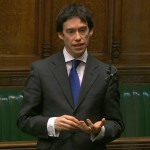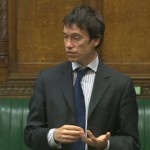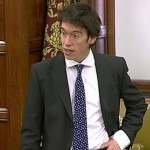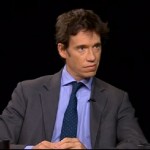Rory’s interview with The New Republic
Article first published in The New Republic by Alex Palmer on 10 September 2014.
There’s a moment toward the end of The Places in Between, the book that established Rory Stewart as a celebrity intellectual, when he happens upon a frozen lake. Places chronicles Stewart’s solo trek across war-torn Afghanistan in 2002, and in this passage, he arrives on a spotless plateau, surrounded by nothing but enveloping silence and a fresh layer of snow. “I walked across the frozen lake,” he writes, “and, standing in the very center, looked back at a mosque carved into a cliff the color of elm wood. … After a few minutes, it seemed I had never been so alone or anywhere so silent. The only sounds were the creak of my staff and my steps.”
As he evades the Taliban, Stewart also finds time to consider the wisdom of a Persian poet (“Man’s life is brief and transitory, Literature endures forever”) and the linguistic similarities between the French and Old Persian words for “journey.” By the time he was 33, The New York Times had declared that Stewart was “living one of the more extraordinary lives on record.” Brave, smart, an elegant writer—and really rather dashing, in an angular, Mick Jagger sort of way—he was a kind of throwback to the last great explorers of the British Empire.
Having seen the world, Stewart set out to change it. Following a tour as a deputy provincial governor in post-invasion Iraq (an experience he chronicled in his second best-seller, The Prince of the Marshes), Stewart went on to found an NGO and teach at Harvard, where he was still based when he decided to run for Parliament. His ambitions were nothing if not grand: As he later told one interviewer, he hoped “to imagine a more serious British civilization. To raise our sense of ourselves.” He set his sights on a seat representing a tony suburb west of London—then failed to even secure the Tory nomination.
Plan B was Penrith and the Border, a rural district—or constituency, as the Brits call them—in England’s far northwest. It wasn’t the capital, but for Stewart, the area did have a natural appeal: With its patchwork of villages and craggy peaks, the area is “the closest to the Hindu Kush you’re going to get in the British Isles,” as longtime Conservative M.P. Malcolm Rifkind puts it. Stewart courted its 65,000 voters by walking the vast region on foot—he still can’t resist a good stroll—and was elected in May 2010.
One afternoon this summer, I accompanied Stewart to a meeting with constituents at the Conservative Club in the sleepy town of Brampton. As Stewart rushes through the door of the squat brick building, a minor drama erupts among the waiting constituents, who are trying to figure out which room the meetings will take place in, what time their appointments are, and whether there is actually an appointment system at all. “Poor Rory,” chuckles a balding man nursing a beer in an empty corner booth. “He’s always a bit late.”
Dressed in a dapper navy suit, Stewart sets a trim black briefcase at his side, removes a pen from his jacket pocket, and stands to greet each arrival, many of whom bear thick packets of forms or petitions demanding his attention. One older man has a handful of letters he has written to various government bodies advocating better programs for the learning-impaired. From the replies he has received, it’s clear that no one has actually read his entreaties. “Absurd,” Stewart says, shaking his head. Another constituent, a thick-set retiree in jeans and a plaid shirt, saunters over and plops down across from Stewart like he has found an empty chair at a cocktail party. With no pressing concerns to discuss, Stewart and the constituent wind up going through the latter’s family tree. (“She’s your cousin, is she?” Stewart asks. “She’s amazing!”) Soon enough, the man ambles back in the direction of the bar. Stewart is never less than attentive during these conversations. But sometimes I catch a look of discomfit—half-smile, half-grimace—reflexively spreading across his face.
Until recently, Stewart wasn’t one of those people who had to worry whether or not things would work out. They just did. (There are many clever students at Oxford, after all; only Stewart was handpicked by Prince Charles to tutor William and Harry.) But his new calling may prove the exception in his glide from one triumph to the next. “Being a backbench M.P. is a bit of an anticlimax for a superhero,” he once told a British reporter. Stewart meant it as a joke, but there was a lot of truth in the remark.
Stewart received a chilly reception when he arrived in Westminster. A Labour supporter in his youth, he had dismissed the Conservatives’ platform as “feel-good, idea-light” as recently as 2007. But he opted to run for office as a Tory, in an election that was predicted, accurately, to be a Tory landslide. His fellow M.P.s sensed an opportunist—and, even more irritatingly, an opportunist they couldn’t dismiss. They dubbed him “Florence of Arabia.”
Stewart’s fellow M.P.s sensed an opportunist—and, even more irritatingly, an opportunist they couldn’t dismiss. They dubbed him “Florence of Arabia.”
Stewart responded by focusing resolutely on his far-flung district. After nearly two decades of wandering the globe, Stewart says, he realized that he needed to “prove that I care about Britain.” (“Broadband. Farming. Intervention. Foreign Affairs. Walking. Sausages,” his Twitter profile read until recently.) He presides over the anniversaries of municipal swimming pools, visits livestock shows, and encourages local businesses to use the new broadband Internet service he fought to have installed in the district. “It’s a job where … much more than you would’ve thought, people expect you to serve time,” Stewart says.
And yet the pull of the world outside Britain remains inexorable. Early in my afternoon with him, during a meeting with the head teacher of a local school, I watched as Stewart thumbed madly on his BlackBerry. “So sorry,” he said, eyes focused on the screen. “Trying to get rid of the news out of Iraq.”
Sometimes, when his duties fail to fire his mind, Stewart invents challenges himself. Two of the voters Stewart meets with at the Brampton Conservative Club are a pair of cheerful, middle-aged women who want to update him on their efforts to reopen a shuttered train stop that used to operate near Hadrian’s Wall. After listening patiently, Stewart leaps in with his own proposal: What if the station was not just a station? What if, instead, it was a brand new hub of local life?
It could be, Stewart continues, “an all-singing, all-dancing community regeneration project,” with a community center, a library, a visitor’s center, shops—and, yes, the train platform, too. Stewart’s eyes widen: They could even get an endorsement from an eminent British historian declaring the nearby stretch of Hadrian’s Wall to be “the finest preserved historical site in the United Kingdom.”
The women are stunned into silence. In a few minutes, Stewart has turned their modest crusade into an epic redevelopment project. Finally, one of them blurts, “Yes, that’s wonderful!”
Later, we drive to Stewart’s office in the nearby town of Carlisle. From the front seat, Stewart launches into an enthusiastic disquisition on his recent trip to the Baltic region, the role of NATO, the development of the modern industrial state. “The problems that worry people today are not like the big issues of the nineteenth century—extending the franchise, ending slavery, women’s suffrage,” he says, a bit wistfully.
We arrive in Carlisle to find only one constituent waiting. Soon enough her concern—unpaid alimony after a messy separation—is addressed, leaving Stewart to mull the state of the British soul. Lately, he has become enamored with some ideas for Parliamentary reform that would reduce the House of Commons from the current 650 members to something closer to 100, as part of a larger shift to a more federal system of government. But, he admits, “I don’t know enough yet about myself or about the country or politics to know if that is even remotely consumable.”
Over the past few months, Stewart has started to win over some of his formerly frosty colleagues. In May, he was voted in as the chairman of the House of Commons Defence Select Committee, making him the youngest head of any select committee. “That’s one of the best things that’s happened to me in Parliament,” he confides.
But because Stewart is Stewart, there is persistent speculation in Westminster that he won’t stick around for long. “I have wondered occasionally whether having done so many different careers, but relatively brief periods at each, whether the same would happen [to Stewart] in the political world,” says Rifkind. A former Conservative advisor relays a widely held view: “Chairman of one of these committees is simply killing time for him.”
I ask Stewart if he thinks he has found his rhythm as a politician. He hunches forward on his elbows and stares off toward the wall. “It’s just difficult to work out what an M.P. is, what an M.P. does, what the role of the public servant today is supposed to be,” he says. “Is this a useful way of contributing, and shaping things? I guess before I did this, it seemed much more obvious.”









